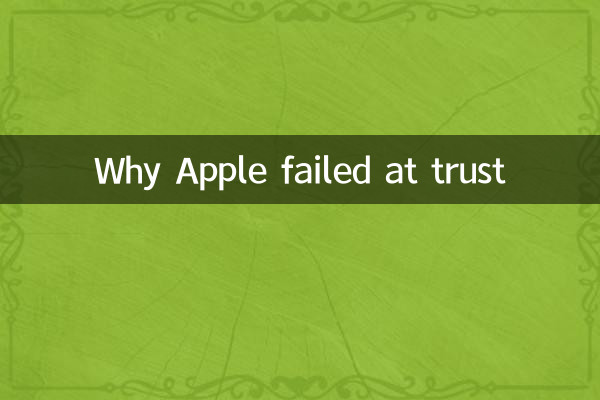Why Apple failed at trust
In recent years, Apple, as a global technology giant, has been known for its excellent products and user experience. However, recent events have raised questions about public trust. This article will combine the hot topics and hot content on the Internet in the past 10 days to analyze why Apple failed to trust from multiple angles.
1. Recent hot topics and hot content

| time | hot topics | Hot content |
|---|---|---|
| 2023-11-01 | iPhone 15 overheating problem | Users reported that the iPhone 15 series phones have serious overheating problems, and Apple responded by saying that it would release an update to fix it. |
| 2023-11-03 | App Store monopoly controversy | The European Union launches an investigation into Apple’s App Store monopoly practices and may face huge fines. |
| 2023-11-05 | iOS 17 system vulnerabilities | Many users have reported serious security vulnerabilities in the iOS 17 system, which may lead to privacy leaks. |
| 2023-11-07 | supply chain issues | Apple suppliers were exposed to use child labor, triggering widespread criticism from society. |
| 2023-11-09 | Apple Watch patent dispute | Apple was ordered by a U.S. court to ban the sale of some Apple Watch models due to patent infringement. |
2. Analysis of the reasons for Apple’s trust failure
1. Frequent product quality problems
In recent years, the quality issues of Apple products have repeatedly become the focus of public opinion. From the green screen problem of iPhone 12 to the overheating phenomenon of iPhone 15, users’ trust in Apple products is gradually being consumed. Although Apple responded quickly and promised fixes, frequent quality issues still left consumers disappointed.
2. The closed nature of the ecosystem causes controversy
Apple's ecosystem has always been known for its closed nature. Although this design has brought a good user experience, it has also triggered controversy about monopoly. The EU's investigation into the App Store is a reflection of this controversy. Many developers and users believe that Apple limits competition and harms consumer rights through its closed ecosystem.
3. Privacy and security issues
Apple has always made "privacy protection" its core selling point, but recent security vulnerabilities in the iOS 17 system have greatly compromised this image. The higher the user's expectations for privacy protection, the greater the disappointment when problems arise. The frequent occurrence of security vulnerabilities has caused users to question whether Apple can really fulfill its promise of privacy protection.
4. Supply chain and social responsibility issues
Apple's supply chain problems have always been its Achilles' heel. The recent exposure of child labor among suppliers has not only triggered social criticism, but also made consumers doubt Apple's social responsibility. Although Apple said it would deal with it seriously, similar negative news is common and has seriously affected its brand image.
5. Patent disputes and legal risks
The Apple Watch patent dispute has resulted in some models being banned from sale, which not only affects Apple's sales, but also makes investors and consumers question its ability to manage legal risks. Frequent patent disputes have exposed Apple’s shortcomings in innovation and intellectual property protection.
3. Summary
Apple's trust failure did not happen overnight, but was the result of the accumulation of multiple factors. From product quality to ecosystem, from privacy protection to social responsibility, Apple's performance in many areas has failed to meet public expectations. In the future, Apple needs to make substantial improvements in these areas to regain the trust of users and the market.
Despite facing many challenges, Apple still has a strong brand influence and loyal user base. As long as it can face up to the problem and actively solve it, Apple still has the ability to rebuild its trust foundation.

check the details

check the details